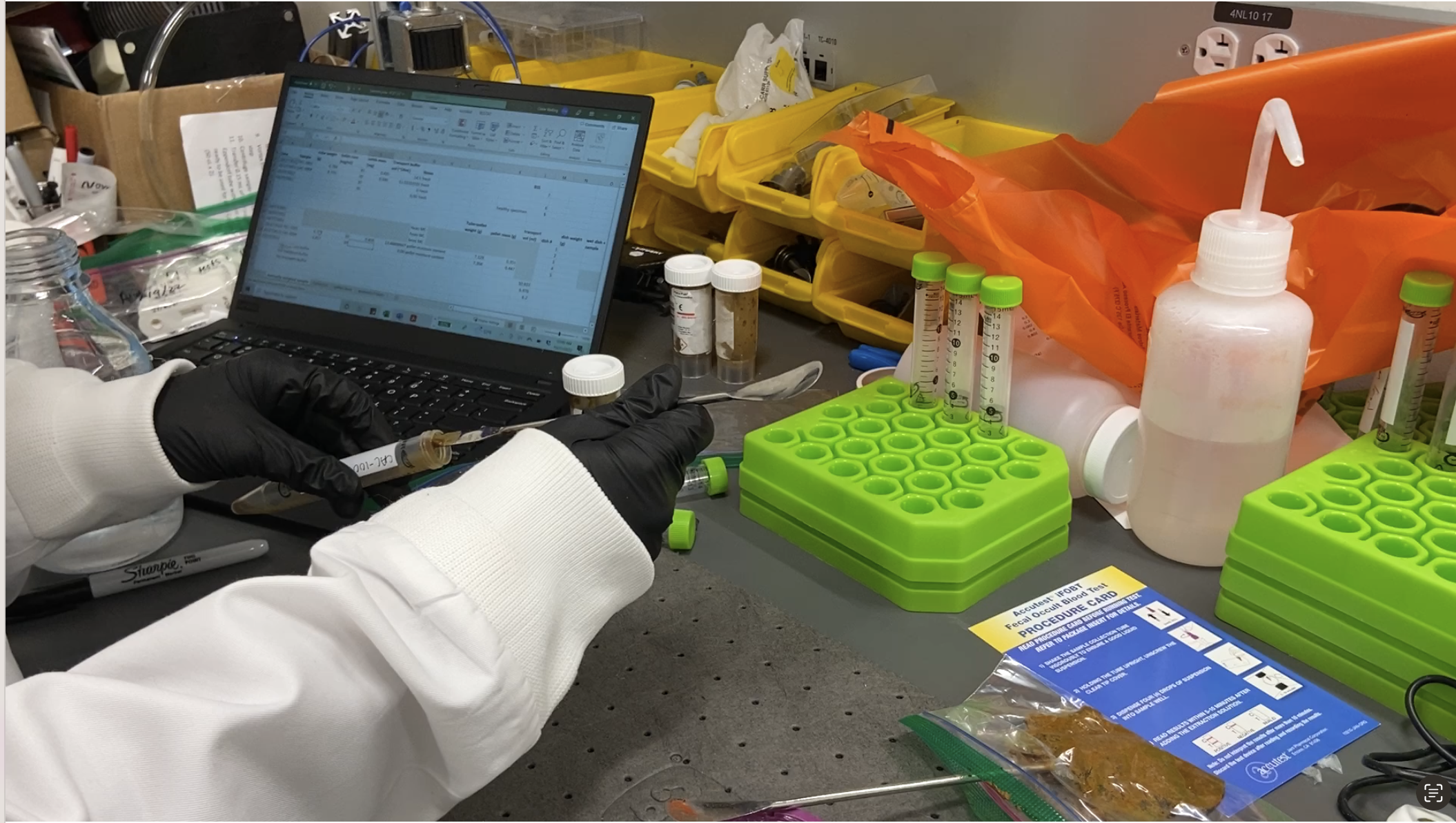Areas of interest
- Microbiome and nutrition
In humans, the gastrointestinal tract houses several trillion microbial cells, known as the gut microbiota, with great functional diversity. The gut microbiota is the focus of intense research for its association with a range of diseases, as well as for the effect of factors such as nutrition and drug intake on individual health and well-being.
Analysis of stool specimen is the foundation of microbiome investigation. Leveraging the Duke Microbiome Core Facility shared resource, we conducted 16S microbiome analysis of stools from the sampling toilet as a novel tool for precision nutrition research and longitudinal tracking of host and microbiome metabolism.
"A hands-free stool sampling system for monitoring intestinal health and disease." Scientific Reports 12, no. 1 (2022).
- Inflammatory Bowel Disease
The impact of gastrointestinal (GI) diseases on patients and the health care system in the United States is substantial, with 54 million ambulatory visits and 15 million visits to emergency departments each year. The annual healthcare cost of $135.9 billion for GI disease in the US is higher, for example, than heart disease ($113.4 billion) (Peery 2019), and is likely to increase. Less costly and invasive than endoscopy, fecal biomarkers exist for biochemical diagnostics for many acute and chronic GI conditions, such as inflammatory bowel disease (IBD), irritable bowel syndrome (IBS) and colorectal cancer. Rapid tests for some of these biomarkers are commercially available for in-home use.
We are investigating integration of such rapid tests with the sampling toilet.
DIGESTIVE DISEASE WEEK CONFERENCE 2023 "Smart Sampling Toilet: A Potential New Automated System for Collecting Fecal Calprotectin Samples." (Accepted). Claire Welling, Brian T. Hawkins, Amy Barto, Hans Herfarth, Sonia Grego.
- Automated bowel tracking
Patient self-report of stool characteristics is critical for diagnosis and management of many acute and chronic gastrointestinal conditions such as bleeding, infection, and inflammatory bowel disease. However, self-report is limited by inaccuracy and by the burden of tracking.
We are developing approaches to automatically detect and classify stool properties in a smart toilet system outside the purview of the user. We combine low-cost sensors with machine learning algorithms. We have demonstrated the feasibility of real-time automated stool characterization by constructing a dataset of over 3000 stool images and developing computationally efficient convolutional neural network methods.
DIGESTIVE DISEASE WEEK CONFERENCE 2021 “Automated Stool Image Analysis by Artificial Intelligence in a Smart Toilet”. Sonia Grego, Jin Zhou, Krishnendu Chakrabarty, Brian R. Stoner, Jose R. Ruiz, Deborah A. Fisher
DIGESTIVE DISEASE WEEK CONFERENCE 2022 "Hands-Free Stool Sampling Toilet for Remote Monitoring of Intestinal Disease". Jose R. Ruiz, Claire Welling, Brian Stoner, Deborah A. Fisher, Sonia Grego. Received Award of Distinction.
- Healthcare-acquired infections and long-term care facilities
Our approaches for automatic, passive tracking of stool pathogens from wastewater at the level of individual or building scale are not limited to COVID surveillance and can be expanded to other pathogens. For example, a major concern is healthcare-acquired infections (HAI), also characterized by asymptomatic carriers that can be detected via stool.
Healthcare-acquired infections affect over 1 million people in the US every year (5% of admissions), resulting in 100,000 deaths and an annual economic burden of $5-10 billion dollars (Peleg 2010). Outbreaks in healthcare facilities are often caused by Clostridium difficile and Carbapenem-resistant enterobacteriaceae, multidrug-resistant organisms (MRDOs) that can be diagnosed by stool analysis.
- COVID-19
COVID-19 testing is a bottleneck in pandemic management. Infection with SARS-CoV-2 (SARS-2) is accompanied by copious and persistent shedding of virus RNA in feces by asymptomatic carriers. Environmental wastewater analysis of virus RNA has been demonstrated to be a reliable measure of infection prevalence in the community (hundreds of thousands of people). Sampling wastewater at the building scale (5-200 people) offers a non-invasive, cost-effective pool-sampling approach for early detection of outbreaks and opportunities for effective interventions. Our group demonstrated a pilot study of wastewater-based COVID-19 surveillance on Duke Campus.
"Predictive values of time-dense SARS-CoV-2 wastewater analysis in university campus buildings." Science of The Total Environment (2022): 155401.

